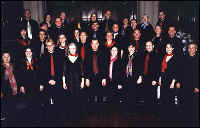 |
 |
Advertise | Sustaining Membership | VAN Store | Feedback
by Adria Quinones and John Lad for Vocal Area Network
Posted May 29, 2003
 On Sunday, June 1, Cantori New York, led by Artistic Director Mark Shapiro,
will perform "Cantori and Strings," a concert of contemporary works for chorus and chamber orchestra at
Merkin Concert Hall at 7:30 PM. Featured is the U.S. premiere of Erkki-Sven
Tüür's Requiem. Tüür has been hailed by Gramophone magazine as
Estonia's "newest rising star" and "one of contemporary music's
most individual voices." His Requiem (1994) has been downright popular in
Europe, having been performed more than 30 times since its premiere, but he is
only beginning to be discovered by American audiences.
On Sunday, June 1, Cantori New York, led by Artistic Director Mark Shapiro,
will perform "Cantori and Strings," a concert of contemporary works for chorus and chamber orchestra at
Merkin Concert Hall at 7:30 PM. Featured is the U.S. premiere of Erkki-Sven
Tüür's Requiem. Tüür has been hailed by Gramophone magazine as
Estonia's "newest rising star" and "one of contemporary music's
most individual voices." His Requiem (1994) has been downright popular in
Europe, having been performed more than 30 times since its premiere, but he is
only beginning to be discovered by American audiences.
A largely-self taught percussionist and pianist, Tüür (born 1959) studied flute and composition more formally at the Estonian Academy of Music with Jaan Rääts and privately with Lepo Sumera. He came of age as a composer during the days of perestroika, the beginning of the end of the Cold War that led to the breakup of the Soviet Union. With increased freedom came increased exposure to music of the West. For Tüür, rock and classical music were equally influential, Frank Zappa and the British art-rock band King Crimson as important as fellow countryman Arvo Pärt. "...in 1977 I attended the premiere of [Pärt's] Tabula Rasa in Tallinn [the capital of Estonia]. It came at a time when it was becoming possible to hear new music on the Estonian concert stage again, and this was a very important experience for me. It changed many things. Tabula Rasa was so different from anything else in modern composition, yet I felt it was very close to my imagination of the kind of music I wanted to make. I don't mean in the terms of its language, its musical material, but rather its essence, its soul, let's say. It had a clarity of expression that spoke very directly to me."
Tüür remains little-known to American audiences, although the Cincinnati Symphony recently gave the New York premiere of his Exodus (1999). Allan Kozinn, writing in The New York Times, noted that work's "kaleidoscopic juxtapositions, with layers of swirling strings and combative brass bursts enveloping everything from a Beethovenesque gallop to a brief string of jazz-tinged pitched percussion."
Requiem has similar multi-hued influences. Tüür has described his compositional technique as a " metalanguage" built from the diverse compositional techniques of the 20th century. "There are composers who are writing tonal, quasi-tonal or modal music and who are more or less 'minimal' and then there are composers ... who use a lot of complex theories making mostly serial or post-serial music. These two factions, if they don't hate each other, certainly they don't love each other too much. What I'm trying to do is connect these two worlds in a single composition so that it's not a mixture but a structurally-felt and built musical totality. ... the idea of contrasts and drama comes naturally to me. It's a very effective way to go from the atonal world to the tonal world."
For listeners familiar with the requiem settings of Verdi, Mozart or Duruflé (which Cantori performed at its last concert), Tüür's Requiem may seem mysterious. In many respects it has more in common with an orchestral tone poem than with those classics of choral literature. It does not contain the struggles of heaven and hell, evocations of religious fervor or conflict. It does not even seem particularly interested in its own text, which is more of a textural element within the piece. Tüür's subject is broader than the Roman Catholic Mass for the Dead, and therefore his piece itself more universal. Tüür is writing about the human experience of death and our need to reconcile that within our lives.
The Requiem is not divided into separate movements but was conceived as an entirety. Within that, it has two major sections of almost equal length. The first section is a move from an evocation of ancient music and Gregorian chant long melismatic lines that builds towards a climax of chaos and dissonance, ending with the text Salva me, fons pietatis ("Save me, fount of pity"). Out of the silence separating the sections comes a soprano solo on the text Recordare, Jesu Pie ("Think, kind Jesus"). The repetitive rhythmic string figures of the first section return along with allusions to Gregorian chant. The harmonic language of clusters and tonal centers creates a meditative mood that persists undisturbed by recurring moments of darkness that echo the conflict of first section. There is no sense of being saved or liberated; neither eternal damnation nor eternal salvation are issues. Instead of chaos--or out of the chaos--there seems to be a resolute acceptance of death and its place as part of life.
The program also features New York-born Andrew Imbrie's On the Beach at Night; jazz legend Keith Jarrett's gorgeous, inspired Elegy for Violin and Strings Orchestra, featuring violinist Curtis Macomber; and the poignantly expressive The Best-Beloved by Chris DeBlasio, a gifted composer who died tragically of AIDS ten years ago at the age of 34. Artistic Director Mark Shapiro says, "The concert as a whole offers a wonderful overview of 20th century compositional practice and expression, and shows off the musicianship of the singers and instrumentalists. Andrew Imbrie's rigorous fervor is beautifully offset by the glowing lyricism and harmonic lushness of DeBlasio and the harmonically static, rhythmically active, ornately ecstatic rock-concert ritualism of Tuur."
Tickets are available at the Merkin Concert Hall Box Office (129 West 67th Street) or online at cantorinewyork.com -- click on Buy Tickets Now. Adults: $25; students/ seniors: $15.
Adria Quinones is president of Cantori New York and a regular contributor to the group's program. John Lad is a freelance string player specializing in contemporary music who writes frequently on tai chi chuan. This is their first article for Vocal Area Network.